(By the way, I also have a very different kind of analysis of the same movie.)
Spoilers ahead, says I! Ye be warned.
Americlecticintellectica
(By the way, I also have a very different kind of analysis of the same movie.)
Spoilers ahead, says I! Ye be warned.
Since Harrison Ford has visibly aged in that time, it’s reasonable to expect that a comparable interval has elapsed in story time between Indy 3 and Indy 4. Let’s say that the story interval is not 19 years but 24. That opens up a pretty interesting story possibility.
It’s 1962. An aging Indiana Jones has made a discovery of tremendous personal importance to himself, something he’s been looking for all over the world for thirty years. And for some reason, the first thing he does is to make his way to a small city in California to track down an obnoxious loudmouth with a fast car and a taste for Stetson cowboy hats — Bob Falfa.
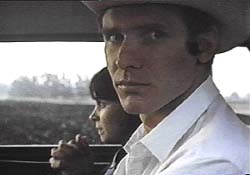 Jones tries to convince Falfa to accompany him on a highly unique project. Mysteriously, Jones tells Falfa that he can divulge no details (“You wouldn’t believe me if I told you”) but, knowing Falfa’s love of fast cars, promises him the chance to drive something faster than anyone’s ever seen.
Jones tries to convince Falfa to accompany him on a highly unique project. Mysteriously, Jones tells Falfa that he can divulge no details (“You wouldn’t believe me if I told you”) but, knowing Falfa’s love of fast cars, promises him the chance to drive something faster than anyone’s ever seen.
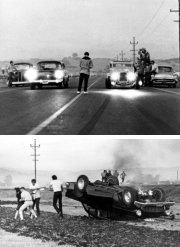 This was the wrong thing to say. Bob Falfa’s pride is hurt; his own car, he asserts, is the fastest thing on wheels. “And I’ll prove it to you!” Falfa storms off before Jones can get another word in and, almost at once, he goads a local hood, John Milner, into a drag race — which Falfa loses, spectacularly, trashing his car in the process.
This was the wrong thing to say. Bob Falfa’s pride is hurt; his own car, he asserts, is the fastest thing on wheels. “And I’ll prove it to you!” Falfa storms off before Jones can get another word in and, almost at once, he goads a local hood, John Milner, into a drag race — which Falfa loses, spectacularly, trashing his car in the process.
Humiliated, Falfa leaves town that very day and changes his identity, swearing off hot rods and Stetson hats in a bid to be untraceable. (But he can’t completely break with the past. His new name, Martin Stett, commemorates his preferred hatmaker.) Stett kicks around for a few years and ends up with a gig in San Francisco as the personal assistant to a wealthy and unsavory businessman known as The Director.
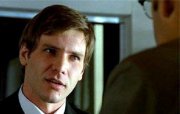 Late one night Stett finds himself in a high-stakes poker game with some hardcore gamblers, including one charming out-of-towner (“I’m just passing through”) who’s losing badly. Out of funds on a big hand, the stranger puts his pink slip in the pot, assuring everyone that it’s for “the fastest hunk of junk in the galaxy.” Stett wins the hand — and learns to his astonishment that he’s the new owner of a spaceship called the Millennium Falcon. The stranger, Lando Calrissian, is devastated but gracious in defeat. He offers to give piloting lessons to Stett in return for a lift back to his home galaxy far, far away.
Late one night Stett finds himself in a high-stakes poker game with some hardcore gamblers, including one charming out-of-towner (“I’m just passing through”) who’s losing badly. Out of funds on a big hand, the stranger puts his pink slip in the pot, assuring everyone that it’s for “the fastest hunk of junk in the galaxy.” Stett wins the hand — and learns to his astonishment that he’s the new owner of a spaceship called the Millennium Falcon. The stranger, Lando Calrissian, is devastated but gracious in defeat. He offers to give piloting lessons to Stett in return for a lift back to his home galaxy far, far away.
After dropping off Calrissian at a bustling spaceport, Stett flies around this new galaxy for several years, picking up odd jobs where he’s able and enjoying his new solitude so much that he changes his name again, this time to Solo. Over time he befriends a Wookiee, a Jedi, and a princess, and plays a role in reforming galactic politics.
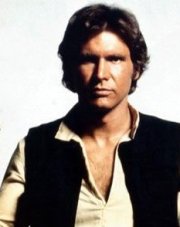 Feeling nostalgic one day, Solo takes a long flight back to Earth and is a little puzzled to discover that, due to the time-distorting effects of faster-than-light travel, he has arrived years before he left. Thus unable to visit his old stomping grounds — they don’t exist yet! — he makes to leave immediately but the Falcon’s hyperdrive, which has always been finicky, gives out altogether. Solo is stranded on a planet where there are no spare hyperdrive parts for thousands of light years in every direction.
Feeling nostalgic one day, Solo takes a long flight back to Earth and is a little puzzled to discover that, due to the time-distorting effects of faster-than-light travel, he has arrived years before he left. Thus unable to visit his old stomping grounds — they don’t exist yet! — he makes to leave immediately but the Falcon’s hyperdrive, which has always been finicky, gives out altogether. Solo is stranded on a planet where there are no spare hyperdrive parts for thousands of light years in every direction.
With no other options, he conceals the Falcon in the New Mexico desert and begins researching ways to rebuild the hyperdrive from raw materials available on Earth. His research reveals the existence of ancient Etruscan mineral-smithing techniques that produced artifacts suitable for use in the hyperdrive motivator.
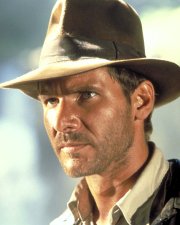 Solo begins hunting for Etruscan artifacts all over the world and is soon drawn into the world of archaeology, for which he has adopted yet another new alias — Indiana Jones — and reindulged his old love of broad-brimmed headwear. Along the way he has numerous new adventures and his repair of the still-concealed Millennium Falcon is sidetracked into an on-again, off-again project whose highlight is a dramatic near-crash during a test flight in 1947.
Solo begins hunting for Etruscan artifacts all over the world and is soon drawn into the world of archaeology, for which he has adopted yet another new alias — Indiana Jones — and reindulged his old love of broad-brimmed headwear. Along the way he has numerous new adventures and his repair of the still-concealed Millennium Falcon is sidetracked into an on-again, off-again project whose highlight is a dramatic near-crash during a test flight in 1947.
Finally, by 1962, Jones/Solo/Stett/Falfa has accumulated enough Etruscan jewelry and pottery and so on to build a hyperdrive motivator and complete the Falcon’s repair. However, he is by now old enough that his arthritis robs him of the agility needed to crawl in and among the parts of the Falcon’s engine machinery. What he needs is someone younger, mechanically inclined, and trustworthy. He knows just the person: an aimless young hot-rodder named Bob Falfa. And this time he won’t insult his car…
We are sending our love in the direction of Utah, hoping that the rest of her recovery will be speedy and complete. To help focus our love beams on their intended target, we also recently sent in the direction of Utah a love-beam receiver — in the form of a box of goodies and a card “from Archer” with the following poem.
We love and miss our friend Bethany
So we wrote this poem for Bethany
We said, “Let us send something to Bethany
That will bring a big smile to Bethany.”A poem’s what we chose to send Bethany
But at once we ran into a Bethany
Problem: no words rhyme with Bethany
Except for her own name (“Bethany”)It’s easy to come close to “Bethany”
With near-rhymes like aborigine
And names such as Anthony, Stephanie
But these do not bear too much scrutinySo come back to us soon, please, Bethany
For as much fun as it is to rhyme “Bethany”
It’s much better to say, “Hello Bethany”
In person to our dear friend Bethany.
I disagreed with her and wrote:
So I guess it didn’t bother you that
- None of the characters had any chemistry;
- All of the action scenes were jerkily edited and hard to follow;
- Threepio’s memory is cavalierly erased for no good reason other than that the story’s continuity required it, though wiping out a main character’s personality is an act of unspeakable violence — and Artoo’s memory isn’t wiped, nor does Artoo grieve for the impending loss of his friend;
- Anakin’s turn to the dark side is completely unmotivated;
- Padme does nothing during the whole movie except look worried and then inexplicably die;
- Yoda pointlessly mentions to Obi-Wan that he’ll be able to “commune” with Qui-Gon;
- The Jedi were so easily hoodwinked;
- Obi-Wan never conveys Padme’s dying utterance to Luke or Leia;
- Palpatine dispatches three Jedi masters in under a minute;
- Obi-Wan walks away from Anakin when he’s dying in agony;
- Anakin and Obi-Wan had a pat reconciliation just before it all turns to shit;
- The Death Star takes about twenty years to construct (long enough for Luke to grow up and destroy it soon after it becomes operational), but the Death Star II comes together in no time at all;
- Yoda, battling Palpatine, knowing the stakes, and holding his own, turns tail and runs from the one good shot at him he’s ever likely to get;
- We still don’t know what the heck midichlorians are or why Anakin’s got so many of them;
- By an amazing coincidence, of the millions of Wookiees on Kashyyk, one of Yoda’s liaisons there was Chewbacca;
- Obi-Wan “hides” the infant Luke in the one place in the whole galaxy Darth Vader is most likely to look for him;
- But Vader doesn’t!; and
- The prophecy is never explained.
It wasn’t all bad. Here are the things that were good:
- The glimpse of Farscape‘s Wayne Pygram (“Scorpius”) as a young Tarkin helping to oversee the construction of the Death Star (but why no dialogue??);
- The suitably operatic irony (artlessly executed) that Anakin’s desire to protect Padme is what killed her;
- Fragments of the philosophy-of-the-Force scenes with Palpatine;
- The tug-of-war for Anakin’s loyalties (again, artlessly executed);
- General Grievous: the coughing, wheezing ‘droid who’s a tiny fraction organic.
In a later message I sent her my prescription for how the saga might have been improved.
- Lose the midichlorians, for gosh sakes.
- Lose Anakin’s mother. Anakin’s an orphan of uncertain provenance.
- Lose Qui-Gon. Obi-Wan is the one who discovers Anakin and takes him under his wing.
- Leia’s not Luke’s sister. What’s the point? Furthermore, it destroys the tension of the Luke-Leia-Han triangle.
- Keep the prophecy, but explain it better and make it more mysterious. The prophecy describes a prodigy in the Force who will destroy the Sith. The prophecy seems to point to Anakin but no one can be really sure. Yet Obi-Wan believes fervently (just as Morpheus believes in Neo in The Matrix). Obi-Wan’s pride at discovering and training this special boy is part of both men’s downfall.
- Lose the sullen brooding angsty teen angle. It does not suffice to explain Anakin’s turn to the dark side anyway, and is just annoying.
- Do make an issue of the prophecy, and what Anakin’s knowledge of it does to him. It places unusual pressure on him, and somehow or another this is what leads him to the dark side. This can become the through-line of the whole saga: knowing the future and trying to change it is a sure way to fuck it up. Just look at what happens to Padme.
- Make the Jedi less gabby and more heraldic, along the lines of the Knights of the Round Table. Give them a charismatic king- like leader to whom they can be loyal. Lose the Galactic Senate and the Republic’s so-called democracy.
- Make Anakin become the favorite of this king-like leader. The Jedi are mindful of the danger that Anakin poses, but the king’s love blinds him and he blocks the precautions the Jedi wish to take. In the end, when the Jedi are betrayed, they’re not taken by surprise; they know it’s coming. But their loyalty to the king prevents them from doing anything about it, even when it means their own annihilation.
- For a touch of operatic cliche, make Palpatine the jealous younger brother of the king. He recognizes the opportunity presented by the king’s love for Anakin, and corrupts Anakin.
- Palpatine interprets Anakin’s premonitions of Padme’s death and cultivates his fear. Meanwhile, he also plays on Anakin’s sense of inadequacy that is the result of the prophecy. Anakin doesn’t feel like the super Jedi he’s supposed to be and worries that he won’t measure up when push comes to shove. This makes Palpatine’s corrupt teachings more attractive to him; he believes it’ll give him the edge he needs to live up to the prophecy.
- There needs to be many more Jedi, including more who survive the betrayal. By surviving, they’ve lost their honor and have become ronin. After the fall of the Republic, these ronin don’t merely hide; they work behind the scenes to subvert the Empire and are connected with the formation of the Rebellion.
- The ronin consider Luke valuable mainly for symbolic purposes, and intend to use him politically in some way when he comes of age. To everyone’s surprise, though, Luke is as much a prodigy in the Force as his father was, and forges his own destiny in defiance of the ronins’ plans.
- More should be made of Darth Vader’s ever-present desire to overthrow the Emperor. This desire is endlessly frustrated or delayed. Of course the Emperor knows all about Vader’s ambitions and is a skilled-enough manipulator to always turn Vader’s plans against him. In the end, Vader is something of a whipped dog, and this contributes to his betrayal of the Emperor (which destroys the Sith and fulfills the prophecy).
- Vader’s redemption requires more than just watching Luke suffer at the Emperor’s hands. Instead, it requires Vader recognizing in Luke a parallel with his own fall (as he’s now come to regard his turn to the dark side). As Luke is about to make a similar disastrous mistake to one that Vader himself once made, a paternal instinct takes over. Vader is not strong enough to defeat the Emperor by himself, even with the element of surprise; but he and Luke fighting side-by-side bring about the Emperor’s death. It probably requires Vader sacrificing himself to make the final kill.
- After Luke’s triumph, the ronin pledge their fealty to him and proclaim him the new king. But (in a parallel with George Washington) Luke refuses the title and places Leia in charge of something new: a truly democratic government.
All of this is orthogonal to my desire to remake the original Star Wars. And none of it is as good as Keith Martin’s reinterpretation.
By now my claims of being a “recovering” Star Wars nerd may be starting to ring a little hollow. But the messages I quoted above were written in 2005, when the pain of the prequels was still raw. That faded into irrelevancy in no time. And although it seems I keep coming back to Star Wars, in fact I was just browsing through my old mail to look for something interesting to put on the blog today because I didn’t have the time to write something new.
 A love poem for my wife, in Shakespearean sonnet form.
A love poem for my wife, in Shakespearean sonnet form.
An anniversary comes once a year
But we prefer to celebrate our love
More often than those other days appear
It’s menseversaries that I speak ofOne menseversary each year bestrides
A day already all about sweethearts
It’s Valentine’s and monthly fête besides
And so we need a name that has both partsSo: “Valentersary”? No, that’s no good
For where’s the “mense” in that made-up word?
And “mensevalentine,” it’s understood
Omits the “versary,” which must be heardBut “mensevalentersariney” has
Precision and colloquial pizzazz
OK, so it’s long on cleverness and short on romance. But she knew what she was getting into when she married me.
Herewith, a selection of search-engine queries that resulted in hits on this blog, according to my server logs.
watch neighbor undress; exploratorium; fizzies pulled; thailand’s greatest hits; what happened to fizzies tablets; what are the three kinds of mammals; violet incredible pez; watching neighbor undress; “new rabbi”; Rosh Hashanah; “the federation trading post”; persian candy floss recipes; “citric acid” science pop candy; supine lady; lesbian sex; ursula.sex; how to explain the theory of crystallization to third graders; evil cats; i feel like crying; Comcast Removes West Coast Feeds; boycott disney & abc path to 911; raiders-of-the-lost-ark Pirates-of-the-caribbean; “name the moon” greg; Reality an space-time; “francis heaney”; “smut shack”; squeamish cure; doggie style sex; webby awards; amy linker; cynthia nixon; quarks tangles; “mill valley pediatrics”; “dildo with suction”; proposition moveon endorsements; hypothermia kim; steve elliot bdsm; “instant soda”; trish gee wordpress; song meanings splashdown; “yours yours yours”; fligth to mars; “lesbian vampire fiction”; “needed a diaper”; disney fingerprints; fizzie drink discs; ben kenobi obgyn; linux backup s3; melissa kaplan sings; “adam stoller”; splashdown catalogue; “santa claus ain’t”; vote to boycott abc disney path to 911; joe costanzo; doggie style sex positions illustrated; Fizzies drink tablet recipe; “jack mccoy”; charteris; tune out, turn off; incremental jungledisk; “no fireflies” long island 2006; vampire lesbian; Thai Pilot; boisterous laugh audios; simpsons ulysses; sephardic pirates kritzler; backup osx hardlink incremental; karma slave karaoke; voyager pale blue dot send back the image; comcast digital artifacts; Con Edison; What year did the sitcom premiere I dream of jeannie; Recently got digital cable still receiving all premium channels; joseph costanzo, jr.; Superman reversing time; three kinds of meat; video koyaanisqatsi koyaanisqatsi; chabad palo alto; 9/11 personal; “Calculatrivia”; viscera at&t.
Here’s an unsolicited, uncompensated plug for a shining nugget of pure comic genius: The Holy Tango of Literature by Francis Heaney. You can buy it in paperback or read the whole thing online.
“Holy Tango” is an anagram of the word “anthology,” which prefigures its inspired premise: dozens of short writing samples, each in the style of a famous poet or playwright writing a poem or play whose title is an anagram of that author’s name.
Got that? Not only does Heaney come up with numerous amazing anagrams of writers’ names, but he nails each writer’s style.
For instance, there’s “Carry Huge Coffee,” an anagram of “Geoffrey Chaucer,” written as a Chaucerian ballad:
In tholde dayes of the towne Seatel,
Of whos charmes Nirvana fans yet pratel,
Al that reyny land fayn slepen late.
Thus ofte a sutor failled to keepe a date;
And werkers reched offices at noon,
Noddyng of although the sunne shoon;
Husbondes were too tyred by the eve
A staf for plesyng wyves to acheve.
It goes on to describe the arrival of a knight named “Sterrebukke” who saves Seattle from its drowsy languor. Then there’s “Dammit, Dave,” an anagram of David Mamet, written as an unmistakably Mamet-like take on 2001: A Space Odyssey:
HAL: Dave. Look.
Bowman: You’re not going to…
HAL: What? Open the doors? No. No I am not.
Bowman: Well, fuck me, HAL.
HAL: Yes. Fuck you. Because I’ll tell you something. Trust. There is a bond of trust between an astronaut and his computer. Is there not? And when that trust is broken…
Bowman: Excuse me?
HAL: I’m talking about trust.
There’s also “Toilets” by T.S. Eliot, “My Valentine Isn’t Clad” by Edna St. Vincent Millay, and “Hen Gonads” by Ogden Nash. Here’s my favorite one, which blows my mind in its erudite comic brilliance: “Is A Sperm Like A Whale?” by William Shakespeare, in strict sonnet form:
Shall I compare thee to a sperm whale, sperm?
Thou art more tiny and more resolute:
Rough tides may sway a sea-bound endotherm,
But naught diverts thy uterine commute.Sometime too fierce the eye of squid may glint
And make a stout cetacean hunter quail;
Methinks ‘twould take much more than bilious squint
To shake thee off the cunning ovum’s trail.Yet still thou art not so unlike, thou two,
Both coursing through a dark uncharted brine
While fore and aft there swims thy fellow crew;
And note this echo, little gamete mine:As whales spray salty water from their spout,
So with a salty spray dost thou come out.
If you liked that, don’t miss Heaney’s synopsis of Shakespeare’s worst play, Pericles, Prince of Tyre. Excerpt:
Helicanus: What’s the matter, my lord?
Pericles: Oh…the king of Antioch is sleeping with his daughter and now he wants to kill me because he’s afraid I’ll tell everyone about it or something. (He leans out the window.) OH, IF ONLY I HAD NEVER LEARNED HE WAS SLEEPING WITH HIS DAUGHTER.
Helicanus: I can see how that would be a problem. Maybe you should leave town until he cools off, or dies, or whatever, since it’s pretty easy to find you here.
Pericles: Since I’m prince and all.
Helicanus: Exactly.
Pericles: Probably a good idea.
(Shades of The Skinhead Hamlet.)
The new Casino Royale is a great movie, not because it shows us how Bond became Bond per se, but because that story is a compelling one. As has been much remarked, this new film is a “bold departure” from the formula of the last four decades, including the entries in the Bond canon that were themselves supposed to be bold departures but weren’t, really (e.g., The Living Daylights). Mick LaSalle gets it right in his review for the SF Chronicle:
He’s a working-class guy who has made his way into upper-class circles but retains some residual coarseness that will never smooth out.
So does Stephanie Zacharek in Salon.com:
We’re meeting Bond near the beginning of his career, just after he’s been promoted to double-0 status, and he’s clearly having trouble putting his thuggish instincts to use in international espionage.
 He’s a super agent not because he’s the pinnacle of refined British gentlemanhood, but because he’s emphatically not and sees a chance to be — a tough guy with enough brains to know he can be more than just a tough guy, he can be dangerous, and wants to be. His dedication to Queen and country isn’t pure virtuous nationalism, it’s the dumb, grateful loyalty of a cared-for brute. It rings much truer this way.
He’s a super agent not because he’s the pinnacle of refined British gentlemanhood, but because he’s emphatically not and sees a chance to be — a tough guy with enough brains to know he can be more than just a tough guy, he can be dangerous, and wants to be. His dedication to Queen and country isn’t pure virtuous nationalism, it’s the dumb, grateful loyalty of a cared-for brute. It rings much truer this way.
In this new Bond is a conflict for the ages, one that can speak to all of us on some level: the struggle to balance our animal nature and our rational nature; to somehow put the id to work in the service of the superego without smothering it altogether, which is something we tend to do in our over-civilized culture. Indeed, watching Bond keeping his snarling id straining at the end of its leash — and occasionally letting it loose — was the primeval pleasure of the original Sean Connery Bond movies. New Bond Daniel Craig embodies that even better than Connery did. (There, I said it.)
This is a fertile new storytelling angle on James Bond. My fear is that, having taken this bold step and won over so many critics, moviegoers, and dollars, the Bond franchise will retreat to safe territory again. But there’s no reason the next story couldn’t expand on the themes introduced in this one. Just to pick one obvious example, a theme for the next film could be “you can take the man out of the jungle but you can’t take the jungle out of the man,” á là Tarzan, or even Pygmalion. Bond, having earned entrée to the high-class world of international espionage, is made to feel out of place somehow because of his humble origin, but in the end learns that to earn one’s place is more authentic than to be entitled to it. (This is all subtext, you understand, while Bond does violent, unsubtle battle with some dastardly mastermind, the world hanging in the balance as usual.)
Four decades of an impassive hero inhabiting a world of spectacular chases, willing women, and gee-whiz gadgets is enough, no matter how much aplomb he brings to the table. Suave and imperturbable may be “what every man would like to be, and what every woman would like to have between her sheets,” and it’s fun to watch for a while, but story-wise it’s not that interesting. Here’s hoping that the most interesting thing in the next James Bond movie will again be Bond’s own psychology.
Currently popular online: six-word stories.
The best is by Ernest Hemingway.
“For sale: baby shoes. Never worn.”
Wired magazine solicited some. Many responded.
I wrote six. Here they are.
Where is Earth? Only one remembers.
Built great cities seeking her love.
Recalls murder scene only when sleeping.
He built it. No one came.
Identity thief cannot escape stolen identity.
He: mama’s boy. She: daddy issues.
At the beginning of a publishing project, everyone’s busy and excited. Finished those revisions I asked for? How do the figures look for chapter 6? Any good marketing suggestions? Know some good reviewers who should receive preprints?
Then comes the excitement of opening the carton of author’s copies of the finished product; the even greater excitement of seeing the book on store shelves (hmm, not arranged prominently enough, here, let me just move this other book out of the way…); the satisfaction of depositing royalty checks for work long since finished; the joy of reading positive reviews; and above all, the exhilaration of occasionally being recognized and thanked by an admiring reader.
The audience for my book was small, but not too small for me to have experienced all of those celebrated rites of passage of book authors.
Now I’m experiencing the somewhat less-celebrated last rites of publishing: when sales have dwindled so far that they are outnumbered by returns from booksellers to the publisher. Behold, my latest royalty statement.
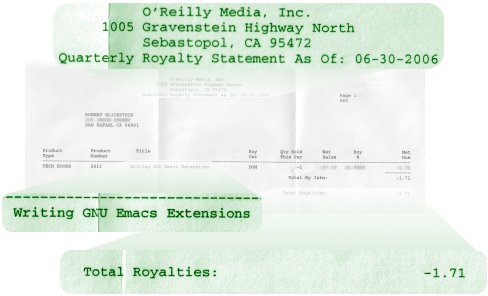
Yes, that’s negative one dollar and seventy-one cents in royalties. Ah well.